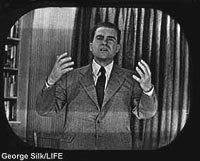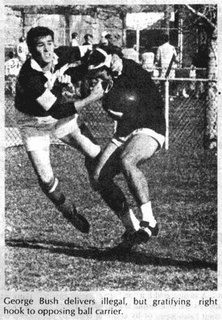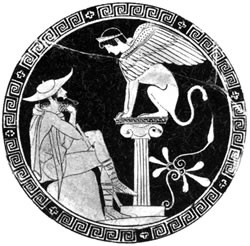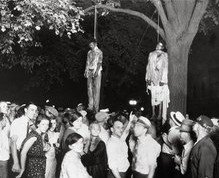Bubble Boy II

The Lynch Mob Meme, Part 5
Among the innumerable inadvertent ironies of Bush’s ascent is the benefit of the doubt he got from this claim of “emotional intelligence.” The claim can only have come from those almost autistically lacking insight or sympathy. Though he has gotten better at reading robotically from the teleprompter, Bush’s mannerisms, whenever he speaks from the heart or wanders away from the script, are like those of the villain in a crudely melodramatic movie; they positively scream: lying, phony, shifty, twisted. Most directors would ask their villain to reign it in a bit, get it down to the level of say Joaquin Phoenix’s evil emperor in
Gladiator. But apparently nobody can give Junior such direction; he doesn’t speak the language, and in Bushese there’s no way to convey this. No wonder untold millions of Americans cannot even bear to witness W’s tortured stammers and grimaces, the weird, desperate semaphor of his body language, like that of a Tourettor trying not to bark or curse. Almost as unbearable, is the post-event analysis of each ever more “Presidential” speech, which until very recently was invariably offered up the ass-licking hacks of the corporate media.
The sheer awfulness and mendacity of George Bush’s every speech, make George Orwell’s much-anthologized essay, “Politics and the English Language,” seem Pollyannish. Technically, W’s entire rhetorical repertoire consists of: nonsense, platitude, malapropism, truism, error, and falsehood. He seems pathologically incapable of speaking the plain truth. So much of what he says proves, upon even cursory consideration, to be nonsense; it’s simply unintelligible because the syntax is mangled, the words are made up, or the sense of one clause immediately cancels out the sense of its apparent complement. Less technically. it often seems that Bush speeches consist of nonsense and falsehood in precisely the ‘Less filling/Tastes Great’ proportions. Indeed, he speeks Advertese, it which truth is a vestigial mood, as subjunctive is in English.
Bush has gotten less halting as he reads from the teleprompter, though not so on the rare occasion when he has to answer a reporter’s question. Still, even at his best, W. sounds very much like a text-to-speech computer program. The elocution is almost right, but the emphases and rhythms are definitely off; it’s as if there’s nobody inside the speech, no truly sentient entity making the sounds.
There are those, especially Mark Crispin Miller, who claim that Bush’s incoherence is somehow adaptive or strategic, a sort of learned-helplessness which allows for infinite retroactive spin, no-fault retraction, and plausible deniability. This seems true, although also sometimes too kind to Bush, as in the following example, which catches the nauseating quintessence of W., though it is hardly the most incoherent or dishonest example in his history. During a press conference on the eve of the Afghan “war,” October 11th, 2001, a reporter asked Bush:
“Mr. President… you haven't called for any sacrifices from the American people. And I wonder, do you feel that any will be needed? Are you planning to call for any?”
The question clearly baffled and alarmed Bush, but bafflement didn’t stop W. from spewing a bit on the subject:
“Well, you know, I think the American people are sacrificing now. I think they're waiting in airport lines longer than they've ever had before. I think that -- I think there's a certain sacrifice when you lose a piece of your soul. And Americans -- I was standing up there at the Pentagon today, and I saw the tears of the families whose lives were lost in the Pentagon. And I said in my talk there that America prays with you. I think there's a sacrifice, there's a certain sense of giving themselves to share their grief with people they'll never, maybe, ever see in their lives.
So America is sacrificing. America -- I think the interesting thing that has happened, and this is so sad an incident, but there are some positive things developed -- that are developing. One is, I believe that many people are reassessing what's important in life. Moms and dads are not only reassessing their marriage and the importance of their marriage, but of the necessity of loving their children like never before. I think that's one of the positives that have come from the evildoers.”
It is worth noting that W. clearly, literally doesn’t know what “sacrifice” means. Not the simple, painful ‘surrender of something for the sake of a particular end,’ sacrifice is a metaphysical, highly theoretical concept for W., something, apparently, to do with the “soul.” On the practical level, Bush has sacrifice confused with any suffering (or even inconvenience) that incidentally befalls one. Then again, how would W. know about sacrifice or how it differs from suffering? He’s never had to work for anything, pay his own bills, or suffer the penalty for his indulgences. So: longer airport lines, that’s W’s idea of wartime sacrifice. The Aphasia-as-Learned-Helplessness theorists might point out that this confusion of terms did allow Bush to avoid politically risky considerations like spiraling deficits and body bags, things which would ensue should a real war break, out as he so wished, and we now know, intended. It is
especially worth noting here, that while one can be a decent person without understanding, say, supermarket code-scanners, understanding of sacrifice is absolutely, intrinsically necessary to real decency and leadership.
(to be continued)
Keep It Simple Stupid

Harry Reid, in his response to Bush's speech today (which speech lays the groundwork for cutting and running from his Iraquagmire before the 2006 elections usher in an impeachment Congress) rightly criticizes the tired old rhetoric and the dearth of insight an ideas. But he ends with the lame new Vichycrat slogan, "We can do better."
If there is to be real reform, if American democracy is to revive from its slide into banana-Republican, the soulless greedheads of the right must be thoroughly investigated, their offenses throughly documented, and where possible prosecuted and punished. The perpetrators must be forever removed from ppwer and influece. America cannot be governed as long as these murderous hatemongers can do as they wish with impunity. The first job of any officeholder now to "Hold them accountable." Nothing less will restore American honor and influence.
So, Harry, repeat after me, "Hold them accountable."
Doing Well and Doing Good

Consider Jack Abramoff, Bob Ney, Tom Delay, Scooter Libby, Duke Cunningham, Tom Noe, Ken Lay, Rush Limbaugh, Bill Frist – just to name a few of the GOP’s leading lights who are currently under legal clouds, that is under investigation or under indictment. The question arises: Are there any honest Republicans today? Check this Hall of Shame: http://www.waynemadsenreport.com/gopscorecard.htm
It’s doubtful, of course, that there are many saints among the Vichycrats, but the Republicans seem to have achieved a really prodigious level of scumminess in recent years. It’s perhaps not really surprising, since the entire posture of the party has been a lie since approximately the time of the Checkers Speech. They claim to be the party of ideas, of accountability, responsibility and decency – as opposed to the godless, sex-crazed, drugged-up, fag-loving, libertine Democrats. The ascendance of Karl Rove and W certainly gives the lie to the ‘accountability-responsibility-decency’ part, and now we may well ask, what are their ideas? Insofar as they aren’t just baldly fraudulent and platitudinous boilerplate, like “fiscal responsibility,” the Republican core beliefs are pretty nebulous and negative.
If he can articulate his beliefs at all, today’s ideal Republican might say something like, “I believe in free markets, in economic growth, in minimal taxation and regulation. I believe that government is best which governs least.” This sounds pretty reasonable, but it’s not really much of a program. Most of these people seem to believe in free markets as others believe in unicorns, and they can’t get their minds around Edward Abbey’s apt observation that “Growth for its own sake is the ideology of the cancer cell.” And ‘lower taxes, less regulation’— aren’t both of these negative prescriptions rather than positive plans? (It’s not as if lower taxes, by themselves, can be used to buy heating oil or health care.) So
who doesn’t have any real ideas?
In fact, most of these Free Marketeers think the markets are the only things that should be free. They’re “social conservatives” which means they want to very much to regulate what goes on in your classroom, bedroom and doctor’s office. Freedom is for corporations and the people who run them not for individual citizens.
In fact, at least since Nixon, the Republican party has been rotting at the soul because of its fundamental hypocrisies. Nixon consciously sought to peel off Southern Democratic votes by becoming the party of the segregationist, and that “Southern Strategy” is fundamental to the party to this day. It is the party of exclusion. Why else would the Gipper have kicked off his campaign with a “states’ rights” (read, states’-right-to-designate-second-class-citizens) speech in Philadelphia, Mississippi, where the three civil rights workers were infamouskly murdered. Why else would Poppy have sunk to the Willie Horton ad? George W. Bush would not have won Florida in 2000 unless his brother had managed to significantly suppress the black vote in that state, and there’s considerable evidence that Jim Crow was at work for the GOP in Ohio, in 2004. No matter what ideals Republican pols give lip service to, the driving force of their party is a libido for punishment and exclusion. Grover Norquist and his ilk would reduce government to the police and military (from which the party contributors would kick profit and kick back) and let the free market and the church charities look after culture, education, science, the environment, and the needy.
The Party of the Swiftboaters, having long ago parted company with any use for Truth, has slowly transformed into a national criminal enterprise. (See Josh Marshall on this point here:
http://www.talkingpointsmemo.com/archives/006629.php.) The nebulous credo of the Free Marketeers amounts merely to a confusion of doing well with doing good, and the party leaders, uncultured, incurious, morally and intellectually bankrupt have only two interests, each of which promotes the other: to enrich themselves and their cronies, and to preserve their power. Moreover, like the Party of Orwell’s
1984, the GOP has no idea what to do with the power it has, its tendency, as principle-free bureaucracy, is simply to perpetuate power for its own sake.
People of the Book

Big Daddyism
People of the Book
A digression from the hydra-headed Meme series: a few weeks ago there was a small controversy in the blogosphere wherein some asserted that the Stalinism and Nazism showed the perils of, and the ultimate extension of, secular humanism. The idea was, apparently, that unless moral ideas are undergirded by religion and/or the prospect of eternal damnation they are quickly discarded and atrocities ensue. Some objected that Nazi Germany was highly Christian and that the churches were often complicit in the rise and crimes of the Reich. But this aside, the idea that Stalinism or Nazism are not religions is absurd on its face – if you look at it from the standpoint of the anthropologist and not that of the zealot. Both are paradigm Western monotheistic cults; they have a lawgiving Prophet (or demi-god), a Book (
Das Kapital and
Mein Kampf), litany, livery, rituals, feast days, prescriptions for how to live and die, and crusades against the heathens who have false gods. Objectively they are perfect spinoffs of Christianity (which is of course a spinoff of Judaism), just like Mormonism and Scientology.
These are not religions only to people who think a “religion” requires, sine qua non, beliefs like theirs. But religion, as Thomas Szasz points out, is more aptly and simply ‘what people do to give their lives meaning.’
The question remains for the social scientists: do such hierarchical, paternalistic structures incline their inheritors and adherents more to sexism, intolerance, genocide, etc. than less paradigmatic modes of belief.
The Boy in the Bubble

The Lynch Mob Meme 4
The Boy in the Bubble: George W. Bush
Many Americans, even his political adversaries, in their misguided niceness, have been much too kind to George W. Bush. They have regarded him as a sincere, regular guy, probably a good guy to play golf with. And it is of course axiomatic that millions of ordinary, decent, Americans, especially those of the white working class, regard W. as a straight-shooter, an all-too-human good fellow, with, like themselves, a reliably commonsensical mind unclouded by the dizzying sophistries of science or culture. Perhaps W. has some unsavory episodes in his past (Who doesn’t?), but he’s pretty much sorta owned up to these, and besides who wants to hear anyone go on about such stuff like some Recovering something or other on Oprah.
George W. Bush, with a lot of input from his handlers, has carefully cultivated this image of regular guy, most effectively by posing with the accessories of American guyness, the shotguns, fishing tackle, golf clubs, brush cutters, and an aircraft carrier. But Bush is no more a regular guy than are the Ralph Lauren models who help their boss conjure a High-Wasp (though somehow also multicultural) world of wealth, ease and sport in the pages of the slickest magazines. Indeed, there is a strange overlap between Lauren-land and the world Bush seems to inhabit; in both, the leisure and discretionary income never seem devoted to anything at all intellectual or cultural, as they would, in fact, often be in the better neighborhoods of England and New England. Bizarrely like the Laurentian stills come to life, the Bush family, as a whole, sometimes seems an odd experiment in elevation of the irredeemably déclassé, something like the Clampetts of Kennebunkport – although, in fairness, the Clampetts still had an endearing capacity for curiosity and wonder. Transparent as W’s pose is, the reporters for years dutifully “report,” that Bush is a straight-shooting cowboy, albeit a “blueblooded” one. And many American regular guys and gals take this as Truth. They believe in W. (naively, slightly desperately) as tots believe in Santa Claus, as Michael Jackson’s fans believe he is a gentle, misunderstood soul.
But George Bush is not and never has been a nice enough guy to play golf with. He is, in his own projective words, "a major-league asshole.” To put it in regular guy terms: He’s the kind of guy whose big, stupid mouth gets his buddies in a fight, from which he then runs away. He’s the kind of guy who writes a check to the poker pot – and stops payment in the morning. The kind of guy who gets you to invest the kids’ college fund in a sure thing, which then goes belly up, as he may explain to you with a shrug in the TV room of his new, entirely unattachable mansion. He’s the kind of guy who used to stun the clubhouse with jokes too purely (and so unfunnily) racist, misogynist or coprophiliac, but now also stuns them with his simpleminded born-again pieties. Given his background, all this is not surprising.
Although, revealingly, Bush’s people ran his presidential campaign on the “character issue,” (that is, against the flawed characters of the philandering Bill Clinton and “prevaricating” Al Gore), promising to restore “integrity” and “accountability” to the White House, we should wonder where Bush’s admirers thought his putative character had come from. The sages of the editorial pages are quick to pontificate, when some black athlete misbehaves, about how the jock's pampered upbringing has spoiled his character development, but somehow they can't export that pyschological insight to a white, ex-cheerleader's case.
Bush himself assumes that he just
has character through birthright, like his admission to Yale and his tap for Skull and Bones. But most of us usually, even reflexively, assume that character comes from life-experience of a particular kind: hardship endured, challenge mastered, adversity overcome, especially through action based in sound values. George W. Bush has no real claim to any such life experience. It should be apparent to anyone who pays the slightest attention to Bush’s biography, that he has been insulated to his detriment from virtually all life’s hard knocks, by his family’s wealth and his father’s power, and his own cunning at shifting blame. Although George W. Bush was academically oblivious, used illegal drugs, drank often to excess, was AWOL from his reserve duty, incompetent on his every job, unethically exploitive and even larcenous in his performance at Carlyle Group, Harken Energy, and the Texas Rangers, he has never been held accountable for any of these lapses. They have been utterly without consequence. He is history’s quintessential example of “social promotion.” Despite his repeated and obvious omissions, inadequacies and offenses, George W. Bush has failed spectacularly upward his entire life. He has been insulated from all, as artificially as a boy in a bubble is from contagion. Bush’s life of total immunity from consequences has produced no character whatsoever. Aeschylus tells us that wisdom comes from suffering; Bush has suffered virtually nothing, and it shows.
Some will point to George Bush’s success as evidence that he does, despite the empirical and commonsensical improbability, embody some miraculous, ex nihilo leadership quality, some initiative, some character – but the exact opposite is true. Bush’s utter lack of demonstrable principle, curiosity, insight or courage have fitted him eminently to purposes of cunning and powerful people, and they have seen to it he rose to positions of maximum usefulness to themselves. (You can almost hear Ken Lay and cronies cackling behind the curtain: ‘Junior’s perfect: no ideas. Tell him what to think and he’ll think he thought it up! ’) He is the useful dupe of that criminal overclass which arose in our society when privilege was at last utterly and finally divorced from any sense of noblesse oblige.
George W. Bush is stupid, crafty at times, but fundamentally stupid. Assuming it was George W. and not a ringer who took the test, he is surprisingly stupid, since he got a 1206 on his S.A.T., not the score of an illiterate. And at one time he was reportedly able, if apparently quite reluctant, to fly a plane in the reserves, so he must have had some presence of mind. But W. doesn’t seem to have smartened up at all since those days; quite the contrary. He may not always have been so stupid, but intellect is not an abstract potentiality, residing immutable, in an eternal Platonic soul. Intellect is very much like a muscle, when not exercised it atrophies. And George Bush has not challenged his intellect for decades, if ever he did. During his gubernatorial years he reportedly spent several hours of every working day playing video games, possibly the least enlightening diversion ever devised. And W’s not really a sportsman or a craftsman, so he doesn’t seem to be habitually involved with the physical world in any grounding or enlightening way. And there is no evidence whatsoever, despite Yale and Harvard degrees, that W. is acquainted with even middlebrow culture, no evidence he reads anything for pleasure (or for that matter, reads anything except the teleprompter in the line of duty), no evidence he listens to any but the most banal music or even sees any edgy movies.
The Osbornes is reportedly W.’s cultural speed. Doubtless he feels reassured by his superiority over at least one rich fellow whose intellectual atrophy is more obvious even than his own. George Bush’s relationship to the English language, and to ideas of any sort, suggests very strongly that the last thing he learned at school was how to cheat. Moreover, this apparently happened at a depressingly early age – before the vocabulary test that included “nuclear” and “malfeasance.” It hardly helps now, that his sycophantic subordinates and mainstream pundits declare things like ‘the President made a good speech’ and ‘the President showed strong leadership’ with such bizarre and suspicious frequency. The effect on W. has been like that of Bruce Willis’ posse telling the movie star he can also sing.
Back during the 2000 campaign Americans were told that Bush might not have conventional intelligence (even Ken Lay didn’t have the money to put enough lipstick on that pig) but that he had “emotional intelligence.” Apparently then, W’s is a whole new class of intelligence, a kind that doesn’t require study, thought, discipline, or experience of the normal world, and which is definitely unavailable to testing. (It’s revealing and curious that W. is such a tireless advocate of testing kids in school. It invites the obvious question: how would he do on those tests?) Some have less approvingly noted that Bush gets notably more articulate when feeling cruel. He may not be smart, but he’s an adequate smart-ass; what wattage he’s got will quickly focus in service of his mean streak. So maybe there is something to this “emotional intelligence” thing, if by it they mean the peculiar sociopathic knack of schoolyard thugs for finding, as they turn their loser’s self-loathing back on the world, the clear insecurities of their invariably defenseless victims (‘Fatso! Nigger! Faggot!’). This seems to be exactly the sort of intelligence George W. Bush displayed for Tucker Carlson, when as Governor of Texas, he so wittily burlesqued a woman who was pleading to have her death sentence commuted to life without parole (and in Christian contrition). The then-Governor answered the plea unofficially, smirking and putting on a mocking falsetto, “Please don’t kill me. Please don’t kill me!”
To those who claim Bush really is intelligent (though perhaps unschooled and incurious) I offer the wisdom of another George, George Eliot, who recognized the type, the turn of mind, and gave it the character in Middlemarch, of Raffles, a boozing blowhard and opportunist, an itinerant grifter. Of him Eliot says, ‘… if the cunning which calculates on the meanest feelings in men could be called intellect, he had his share, for under the blurting rallying tone in which he spoke, there was an evident selection of statements, as if they had been so many moves at chess.’ (To be continued.)
On Hating Bush

The Lynch Mob Meme, part III
It is sometimes asserted that those who hate Bush do so in a plain reversal of the peckerwood prejudice against Slick Willy Clinton, he of the so very threatening panache and intellect. And there’s some truth to this. Surely, some of the reason the peckerwoods hated Clinton is because he himself is a peckerwood who somehow got himself above them. It’s got the same roots as the so-called “narcissism of small differences”, that tendency of most the virulent hatreds to flourish between people most alike. Indeed, it is worth another little digression to consider Clinton Hatred here. The man from Hope has a quintessential American Dream story (even if it’s got some schmutz on it). He went from a modest background to the White House by dint of hard work, charm, nerve and cunning. And then he was by millions hated for it, reviled as Slick Willy. The resentment many Americans focused on Clinton is very reminiscent of that which bourgeois Germans directed at their Jewish countrymen. Many German Jews, mindful of horrific histories and precarious prospects, had sought to secure their positions in German society by dint of hard work, education and accumulated wealth. The more complacent gentiles around them were envious, and especially when persuaded, violently resentful of such Jewish success. The Jews were too cunning, too sly, too slick for their own good, they believed, and then some set about operationalizing that belief.
Leaving aside for now, the many good reasons to oppose W. and his policies, many upper middle class citizens seem to hate the man blindly, but not, it seems, as a result of propaganda. The projective content of this hatred is worth examining. I propose that many find in Bush an objective correlative for their own subjective moral misgivings. Bush, in many ways is us. He is not some exotic moral monster like Idi Amin or Hitler or Saddam; his sins (at least prior to his elections) have been mostly venial. Like most bourgeois, he is mostly (as the vile French are wont to say) “capable of any crime that does not require courage.”
W. is manifestly a slacker. It’s perfectly obvious that, like many of us Boomers to varying degrees, W is a skirt-chasing, draft-dodging, buzz-catching, corner-cutting, tax-cheating, expense-padding, spotlight-hogging, self-deluding, browbeating, bullying bullshitter – above all he’s self-indulgent. He has enjoyed a series of largely figurehead jobs for which he was not qualified and which he did rather badly, preferring to cherry- pick the perks, the ego strokes, and the ladders up, rather than do the actual work. (He might have found a happy niche in Hollywood had he the slightest gift for gab.) He has been, in all things, no better than he had to be. But we know many such, know them as such, and do not hate them. We may even enjoy or cultivate their company for various ignoble slacker reasons of our own. So why do we hate W. so?
Not all Americans fit the slacker’s profile I’ve just presented, and, perhaps precisely to the extent they do not, many of these people harbor no particular hatred for Bush. Many do not recognize Bush as such a person, innocently (or perhaps negligently) taking the carefully cultivated corporate fiction (the repentant, straight-shooting Christian Cowboy) for the real thing. We might negatively acount for this myopia, particularly among those not so spoiled by privileged upbringing, by invoking the slacker’s equivalent of Gaydar: “It takes one to know one.” And know Bush for one of us we do, viscerally.
Many others are also like ourselves, and like Bush is, but they celebrate his ascendance. These are perhaps the most morally untroubled individuals, they serenely accept or ignore their own shortcomings and misdemeanors, often through an all-encompassing sense of entitlement. They do not project their troubled consciences onto Bush, either because their consciences do not trouble them (they believe that this is just what men
do), or because like Bush, and very often
with Bush, they have opted for other projective strategies. So again, why do the dark hobbyists of the political internet seem to hate Bush so?
Some of it is incidental, or accidental. We partly hate Bush for the same reason, and with precisely as much moral force, as many Bostonians hate the New York Yankees. We were born into Democratic families or turned up that path in college, and so the coin just falls on that side. Then too, much of our hatred is rooted in Bush’s hypocritical sanctimony, his own insistence on the born-again moral clarity with which he claims to see the world. But here too, in the moral clarity with which we seem to see the world, we may be rightly caught out in our own projective fallacy, in the projective nature of our own Bush-hatred. For the hatred of the sanctimony is in itself hypocritically sanctimonious. Sure, we say, I may have indulged in any number of the above-referenced peccadilloes, but, ‘I didn’t sell out the Harken stockholders! I didn’t steal an election! I didn’t lie us into war? I didn’t …!’ But in truth, many of us didn’t do these things primarily because, in the accident of our births, the opportunity to do so was not given to us by the powers that be. Virtually all of us are eminently capable of the incremental denial, equivocating, rationalizing et cetera, that has led Bush to do many of the destructive and immoral things he has done. We are cut out of the same moral cloth, however differently ours may be patterned.
There is a deep problem with the slacker’s Bush hatred: true to form, it’s self-indulgent. The manic energy that keeps us surfing through the left-wing tunnels of the internet, in far too many cases, is a sort of bad-love neurosis. It’s obsessive behavior, it comes from the same lobe that drives the stalker, the addict, the Bennett-style gambler; it’s a hobby, elevated to mortal need or High Purpose, which takes over our lives and drains off energy and resources that might be devoted to our work, our loved ones, or even our country. It arguably sours the discourse, and makes the language of our arguments more aversive than convincing. It makes the job a Crusade, precisely because it’s more fun to go on a Crusade than to work. But perhaps we shouldn’t indulge ourselves so, for there is much patient, clear-eyed, dispassionate work to be done, if the Bush administration is to be hobbled, and its damage is to be undone.
This said, it should be asked: can one rationally despise Bush, the man, without merely giving voice to one’s own self-loathing? The answer is yes, certainly, for there is also a very real sense in which W. is not one of us, and is becoming less so every day. There are, owing to his birth, certain unfortunate quantitative, qualitative and even existential differences between W. and the more average slacker, and these are being exacerbated daily by the stresses of a job for which he is woefully inadequate, by the deranging effects of fame and power, and by his lifelong and fast-deepening isolation from the world of cause and effect, acts and consequences. (To be continued....)
Meme 2
Part 2 of a Series

(Wherein the Author Digresses in Plummy Alistair-Cook Tones, Hoping to Clarify a Few Concepts before Applying Them to Cases)
Evil has exactly the same sort of reality as knowledge and consciousness; it exists in that it persists over time and operates in and on the world. But when we would locate it in the world, it’s a mirage. There is something deeply primitive in the operation of evil (and its ubiquitous symbolism); it seems to arise in a sort of pre-classical aspect of consciousness, which is found nowadays among those little inclined or equipped to know themselves as individuals, but formerly among those conditioned to function half-aware within long fixed traditions and institutions. By the evidence of the texts, at least, in ancient times such people were much more inclined to locate endogenous phenomena, such as the whisperings of intuition, and other products of subconscious process, in the external world. Dreams, inspirations, emotions, intuitions, conscience, and delusion were thought produced by gods, muses, harpies, curses or demons. Gradually the collective consciousness raised itself with shared experience, sophistication of language and metaphor, and, as truly modern individual consciousness came about, myths arose depicting a phenomenon, the endogenous/exogenous confusion. Most poignant are Narcissus and Oedipus, but there are many others.
The Oedipus myth is quintessentially germane to the understanding of evil, an almost rococo depiction of the evil’s projected mirage. A brief recapitulation: When Theban King Laius consults the oracle about the children to be born to him and Queen Jocasta he is told, ‘You will have a son and then die at his hands.’ When the son, Oedipus, is born Laius condemns him to death by exposure, but a shepherd rescues him and gives him to the king of Corinth who raises him. Grown, Oedipus consults the oracle and is told to avoid his homeland, for he would murder his father and marry his mother. To avoid this fate, he exiles himself from Corinth and wanders into Thebes, where he kills an arrogant stranger at a crossroads – King Laius. Then he rescues the city by solving the bedeviling Sphinx’s riddle (‘Man is the animal that goes on four, two and three feet.’) Oedipus the hero marries the Queen – his mother. But plague besets the city; the unexpiated murder of Laius is the cause. The vainly clever Oedipus vows to find and banish the culprit. Interrogating witnesses, he does finally sleuth out the perpetrator: himself. Subsequently Jocasta hangs herself in horror: Oedipus stabs his own eyes out (literalizing his metaphorical blindness) and banishes himself as promised.
The Oedipus tale is a recursive variation on two themes: unintended consequences ushered in by preventative measures (the gods’ wickedly ironic joke woven through creation), and the blindness of objective certitude. Oedipus embodies the second theme; he sees the evil in his blighted kingdom, but he can’t see in this the operation of his own guilt. He knows the nature of “man”, but he doesn’t really know who he himself is.
Oedipus is, of course, a myth, a metaphor in psychology; the story’s metaphor is paralleled and its moral more succinctly stated in words attributed to Jesus:
Judge not that ye not be judged. For with that judgment ye judge, ye shall be judged: and with that measure ye mete, it shall be measured to you again.
And thy beholdest thou the mote that is in thy brother’s eye, but considerest not the beam that is in thine own eye?
Or how wilt thou say to thy brother, Let me pull out the mote out of thine eye; and behold, a beam is in thine own eye?
Thou hypocrite, first cast out the beam out of thine own eye; and then shalt thou see clearly to cast out the mote of thy brother’s eye.
In Oedipus and Mathew are the same tropes: the mirror-like (I’m-rubber-you’re-glue) rebounding of moral consequences, and the confusion of endogenous discontent with exogenous affront.
No educated person is particularly surprised by such projections (in others, anyway), but everybody should be aware that they often form the imprimatur of evil, which like the most elusive of subatomic quanta, we know mainly in retrospect, by the path it has described through the world. Western history is replete with, or even largely composed of, atrocities undertaken to exterminate an evil for the greater good: the Holy Wars, the Inquisition, the Hundred Years War, the Witch Hunts, the Genocidal civilizing of the heathens, the Civil War, the War to Make the World Safe for Democracy, Prohibition, the Soviet purges, the Holocaust, the Irish Troubles, the War on Drugs, Vietnam, the Killing Fields – none of these accomplished their putative ends, but they did wantonly loose untold suffering into the world by persecuting the evil du jour. Thus, over and over, evil, the unintended consequence, is promoted by the measures taken against it. Nothing then should be less surprising than evil perpetrated through a war on the Axis of Evil.
The Lynch Mob Meme

Part One in a Series
A Moral Prolegomenon:
In August of 2003, ago I car-pooled with a friend of mine from Virginia to Manhattan, and we used the long ride to discuss some things in-depth, as has long been our vaguely academic habit. He is a social psychologist, and so I sometimes sound him on matters pertinent to his field. At one point I quoted the social observer Cintra Wilson on the grotesqueries of Las Vegas, “I find it to be generally true that the people with the most hateful, inhumane, intolerant politics are suckers for the most obscene forms of guileless sentimental exploitation….” He’d studied bigotry and I wondered if there had ever been any studies done on a link between sentimentality and intolerance. He gave me a very professional answer, something about how difficult it would be to define sentimentality and intolerance, let alone to map their overlap. But he liked Wilson’s notion and found it aphoristically apt. We kicked around examples: the Confederate’s mania for Sir Walter Scott; Gestapo thugs going all weepy over Lily Marlene; sociopathic shit-kickers addicted to the bathetic tableaux of Country-Western music. Not surprisingly, the talk turned to the fans of George Bush and their mania for yellow ribbons, flag-magnets, and liberators being greeted with flowers. My friend, a self-described Rockefeller Republican, interrupted my satirical fulminations to ask a question that has vexed me ever since, “Do you think George Bush is evil?” I must admit to having disliked W, almost from my first glimpse of him, but my answer on that day was a qualified “no”. Still, it’s a serious question, although borderline nonsensical too, not at all “academic,” and it demands returning to and very careful consideration.
Precisely because George W. Bush has so often brought the subject up, it’s well worth considering W. and his problem with “evil.” In fact, he has no business talking about evil – not because he’s no saint, and so lacks moral authority, but because he lacks the subjective qualifications. Many might object that evil is within the mental capacities of even the simplest folk, but there they are confused. Right and wrong are fairly commonsensical, and though sometimes difficult to discern in particular situations, they are usually discernable by most. Evil is a very different phenomenon. A rough distinction may be helpful: we often do wrong in service of our appetites or dereliction of our duties, and we may commit horrific acts in the thrall of psychopathology, but we usually descend to evil when we strike out, and especially when we induce others to strike out, against evil itself.
Evil is one of those very essential but difficult categories which mediate consciousness and the world. These categories are essential to meaning, to understanding reality, but they are not, independent of consciousness, forces in the world, or objectively real. Analogous are concepts like: truth, love, and luck. Indispensable as they may be, it is error to personify or reify them. This is a truth that’s very hard to remember, and in innumerable ways we constantly backslide into atavistic idolatries, when we forget this difficult lesson. Exemplary is one of the most dangerous things we can do, precisely what George W. Bush prides himself on doing, concluding simply, ‘I know Evil when I see it.’ This is always error for we never really see it; at best we postulate it. To the extent that we reify evil, we become its midwives into the world, the agents of what was more properly damned to mere potentiality. W and his cronies want to advance the notion of an Intelligent Designer behind evolution, but the operation of an Evil Genius sometimes seems more plausible from observed cases. Indeed, the way evil seems to gain force whenever we try to fight it with force seems diabolical.
The Cheney Memorial

So, Dick Cheney, the man who could find nobody better suited than himself to be the Vice President, the Vice President who
still gets paid by Halliburton, he of the 'Saddam has reconstituted nuclear weapons' claim, now finds that war critics are engaged in "revisionism of the most corrupt and shameless variety." Project much?
I'm a little surprised anybody in this administration would bring up concepts like shame and corruption for fear that the people... oh never mind
The Vichycrats
There is much discussion over at Talking Points Memo about the idea that the Democrats are rhetorical wimps. The party of Karl Rove kicks ass because they're so good at toxic sloganeering, fashioning the kind of bumper-sticker smears that really... stick. I think there's a great deal to this notion. The Kerry campaign is the paradigm case, but they Kerryites were just following the tradition. The Democrats have always avoided simple, direct indictments of their opponents, for reasons never clear to me. They're like victims of abuse, afraid to do anything for fear of the price they'll pay, oddly co-dependant and enabling.
Back when Michael Dukakis was getting his ass handed to him by Bunnypants the First, the Democrats should have gone on the attack and usefully reminded the electorate of a little American history. They could have rustled up some grieving survivors of the Marines blown up in Beruit and asked them "How do you feel about George Bush dealing 2,000 missiles to the supporters of the terrorists who blew up your boy?" It would have been 100 percent pertinent, and it might have given the voters a chance to actually hold a pol accountable.
Kerry could have refuted the flip-flopper charge very simply, "I voted with the President because like most Americans I trusted the President. I see now that this was a mistake." He needed to say that plainly. Failing to call a liar a liar was a disservice to the people he promised to really fight for, and to the country in general. We could be much further along in wising up the electorate had Kerry taken the lead here. Ah, but that would have been like being a leader.
The Democrats are too often people who want the job, but they don't want to
do the job.
The Bush Oath
I pledge allegiance to the Hype,
to evil's banal, stupid might,
to knowing I am always right
and letting others fight my fights.
Miller Analogies
Miller Analogy
truth : newspaper :: food : toilet
Corollary 1
facts : Fox :: peanuts : feces
Stairway to Heaven

It sometimes seems that W's tale is as pure a tragedy as Macbeth's -- the hero comes to believe he's favored by supernatural forces, usurps power and, under the corruptive influence of that power's intoxication, comes to believe himself a very god, one exempt from the laws which hold ordinary mortals, one who 'creates his own reality'. This delusion spreads to his worshippers too. Reality, of course, has other ideas, and is in the process of springing its catastrophic joke.
But W is no Macbeth. He can't really be tragic, in the Aristotelian or Shakespearean way, because he is a man without qualities. Utter banality cannot be tragically flawed.
So the fiction that really captures our condition is more modern; it is
Memento. W is not the hero/victim, that is the American people, who, grievously shocked by 9/11, have been unable to lay down new memories. That's why W's stooges have been able operationalize a new lie, often in contradiction of the old lie, at will. The People know only that they've been assualted and that someone must pay. W's role is that of the corrupt cop who spins the amnesiac, turning him to his own murderous purposes. Slowly, given the prosthetic memory of video-tape, many are coming to something like a realization.
Top Ten Reasons for Starting this Blog
1. Peer Pressure.
2. Not enough dimwitted opinions in the blogosphere.
3. Another opportunity to be ignored.
4. To impress chicks.
5. Show publishers and movie studios they really need a wordsmith like me.
6. Parole officer insisted I get a hobby.
7. Bring down global conspiracy of evil-doers.
8. Trying to seem hip.
9. Need to pad my resume.
10. Don’t know what I think ‘til I see what I say.
It's Alive!

Cue the Champagne Lady
This is more a less a test. More soon.











